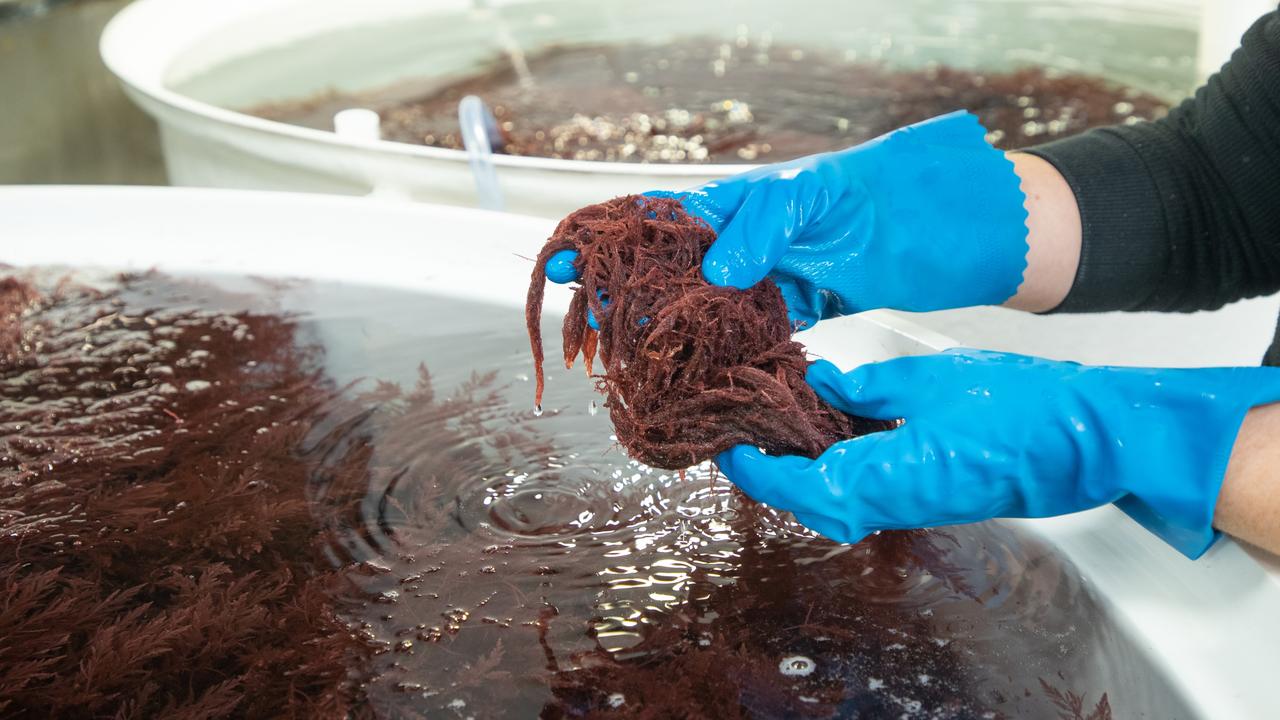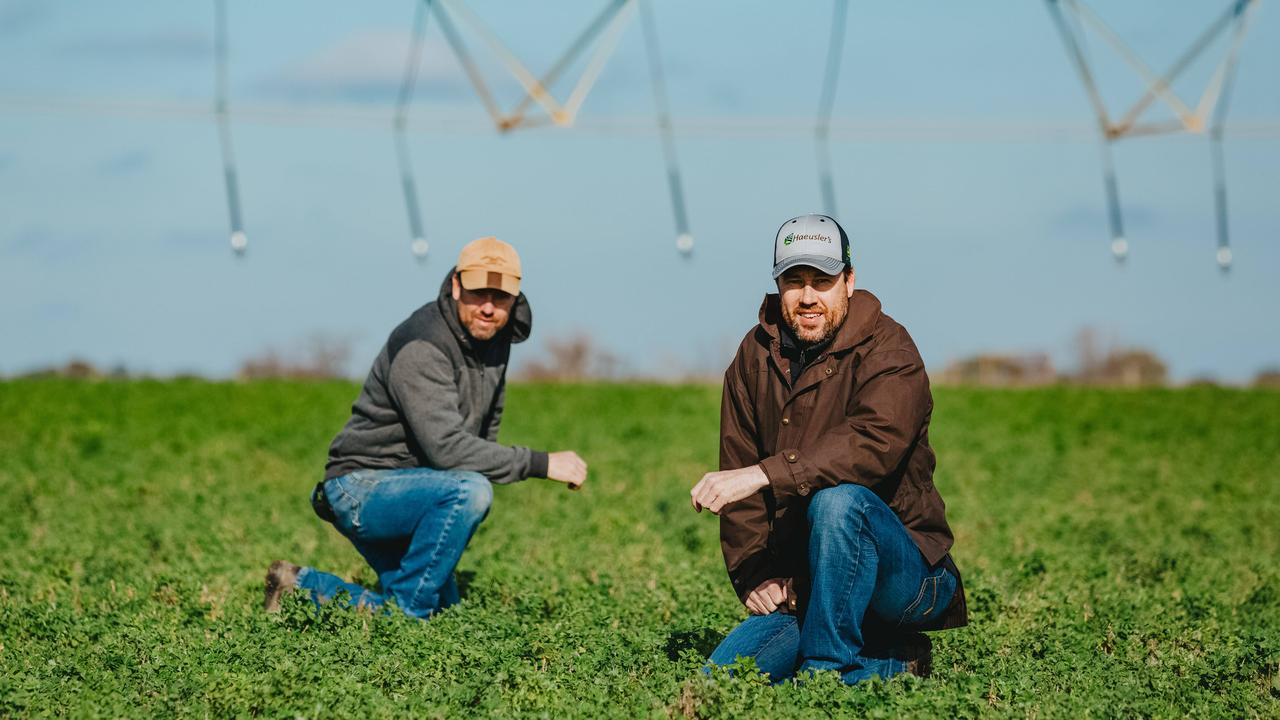Trading in money and power for a happy farm life
DONOVAN and Melissa Jacka fled Melbourne for life in the North East yet they still wake at the crack of dawn, not to fight traffic but to milk goats and make cheese. SARAH HUDSON reports.
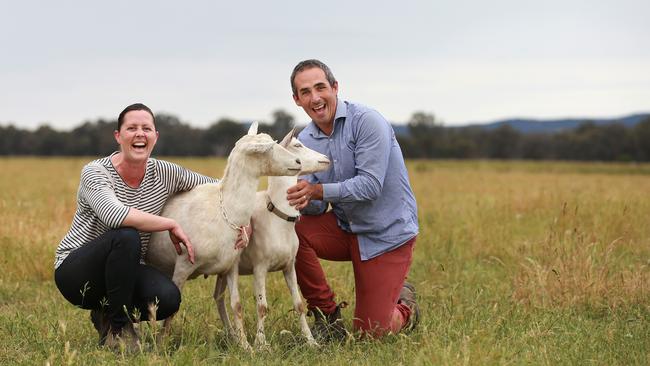
DONOVAN and Melissa Jacka know a lot about job satisfaction.
For two decades, both their careers revolved around industrial relations and unions, ultimately working in high-powered jobs for the Victorian Government.
Yet the couple increasingly found that in their own lives, job satisfaction was beginning to feel elusive.
“We had incredibly well-paid, comfortable lives and beautiful children in great schools,” Donovan says. “But there was a sense that this treadmill wasn’t something we’d always enjoy.”
Guided simply by their love of eating cheese, the Jackas left Melbourne in 2013 and bought a 50-hectare property at Tarrawingee in Victoria’s North East, a herd of Saanen goats and established a cheese factory in the property’s 1850s underground cellar.
And what did they call it?
Tolpuddle Goat Cheese and Farm Foods, named after the Tolpuddle Martyrs — six English farm labourers from Dorset who were sentenced to seven years’ transportation to Australia in 1834 for forming a trade union.
“When I worked for the Australian Council of Trade Unions for eight years I taught the history of the labour movement,” Donovan says. “The Tolpuddle Martyrs were a group of agricultural labourers who got together to form a union. They were noble workers who didn’t want to be rich, but wanted a better life, to put food on their table and live reasonable lives.
“When we came to this property and the real estate agent showed us the underground cellar and we realised the backbreaking labour it took to build it, we wanted to honour that with the name.
“And in a way it’s what we’re doing, too: Giving up powerful jobs for something we knew would earn us less money and be harder physical work, but for a reasonable life.”
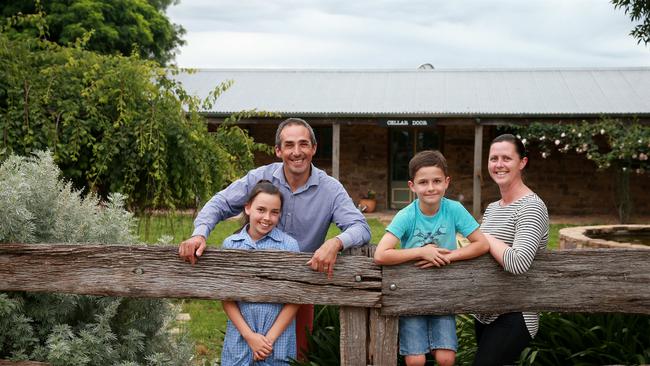
Three years on and Donovan and Melissa say they couldn’t be happier. While Donovan continues full-time work in employee relations based in Albury, the ultimate aim for both of them is to work full time on the farm, with Melissa as cheesemaker.
For now, 44-year-old Donovan has to be satisfied with getting up each morning at 5.30am to milk the flock of 24 before he heads to work.
The couple aim to breed 50 milkers within two years and in the next decade build to 100, which will sustain two full-time jobs, as well as employing staff.
Donovan says he relishes the morning milking, given they based their farm business around their love of the goats.
“We have always loved cheese,” he says, “and the idea for a cheese factory really started when Melissa did a cheesemaking course at Red Hill Cheese in 2006. She made a brie and it was delicious.”
Melissa subsequently completed a year’s cheesemaking course through the Artisan Cheese Making Academy in South Australia.
“It was an epiphany,” Donovan says. “From then on it was our dream to make cheese.”
For years they looked for properties, wanting a foodie area. But, unable to afford the Yarra Valley or Mornington Peninsula, they settled on the North East, falling in love with the farm’s 1850s building with cellar, perfect for cheesemaking.
For the past two years they have renovated the 60-square metre building to house a cheese factory. In November they opened part of the building as a farm shop, aiming to be open to the public about four days a week by spring.
In the couple’s eyes, cows are “massive, terrifying beasts” and sheep a little “stupid”, so goats were an obvious choice, especially as “they are affectionate, sweet-natured and intelligent, like having Labradors”.
The Jackas chose to milk Saanen goats because they say the genetic pool of the breed is “excellent” and easily available. To start their herd, they bought two males and 20 females from a dairy in northern NSW.
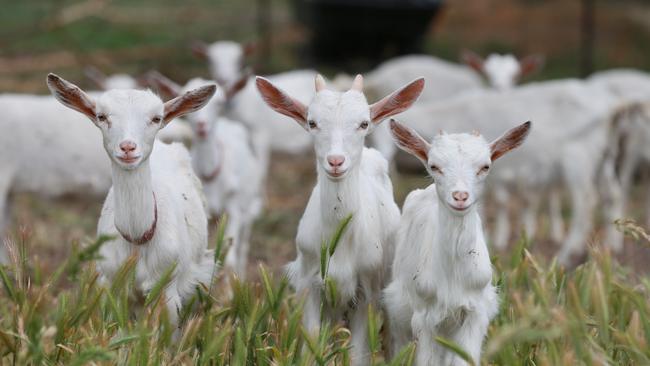
Donovan read widely and was grateful for advice from Drysdale Goat Cheese on the Bellarine Peninsula. Through these sources he knew to ensure the goats had certified vaccinations against “the two big nasties in goats” — caprine arthritic encephalitis and Johne’s disease.
“Other than that, I looked for milk volume,” he says.
Their Saanen goats come into season in autumn, with kidding in August to September.
Kids are kept on their mothers for about four days, before being fed extra milk and formula, then weaned at 16 weeks.
Males are then slaughtered and their meat sold to local restaurants.
The family also has two Large Black pigs, Elvis and Priscilla, which they hope will develop into a side-line pork business in years to come.
Saanens can be milked all year, with their milk volume reducing slightly in winter. They just need “freshening” with a new pregnancy every few years, so the Jackas ensure does have kids at ages one, three and seven. “So they only have three pregnancies in their life, which is less stressful on them,” Donovan says.
On average each goat produces 2.5 litres of milk a day, in a single morning milking.
The flock grazes in paddocks across most of the farm, foraging on tree branches, including elms, oaks and ash (which Donovan cuts for them), as well as limbs from fruit trees.
The Jackas feed goats on hay cut from their pastures of clover and ryegrass.
While the flock is being milked in the eight-stand dairy, they are each given one kilogram of grain mix, oats, barley, lupins, chaff, seaweed and dolomite.
For health, they are also given a salt lick, as well as conventional treatments of vaccinations, worming and antibiotics when needed.
Aside from that, they are low-maintenance, with Donovan’s least favourite job clipping their hooves.
In the dairy, the milk is either refrigerated at 2C for up to 48 hours, or used immediately. It is pasteurised to 63C for 30 minutes, then cooled to 20-25C to make cheese.
Melissa makes six products: chevre, ashed chevre, marinated Persian-style fetta, curd, milk and the most popular, a French farmhouse cheese, white mould on the outside, gooey on the inside.
They make about 65kg of cheese each week, from 385 litres of milk, which translates to about 1.7kg of product for each 10 litres of milk.
The Jackas have more demand than supply and sell at one Melbourne farmers’ market a month, with the remaining cheese sold to retailers and restaurants in North East Victoria.
Donovan says having established the farm on a dream — naming it after the early noble unionists — Tolpuddle has not soured with time.
“I have never appreciated more the incredibly hard work of people who work with their hands. All we’re doing is making something for people to eat, but it fills your heart,” he says.
“I feel more alive and invigorated doing manual work, more connected to the land and history than I have ever done in an office job. This work is much more rewarding.”
FARM FACTS
Donovan and Melissa Jacka and their two children, Mackenzie, 11 and Harvey, 8, run Tolpuddle Goat Cheese and Farm Foods on a 50-hectare property in Tarrawingee, North East Victoria.
They milk 24 Saanen goats, aiming to breed to 50 milkers within two years and in the next decade build to about 100.
Melissa is cheesemaker and produces six products: chevre, ashed chevre, marinated Persian-style fetta, curd, full-fat milk and a French farmhouse cheese.
Cheese prices range from $9 for 150g chevre log to $14 for the best selling French style farmhouse cheese. Goat milk is sold in one litre bottles for $7.
The products are sold at one farmers’ market in Melbourne each month, as well as to retailers and restaurants in North East Victoria.

